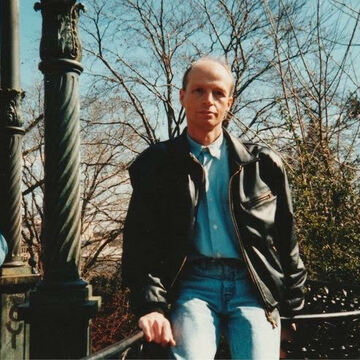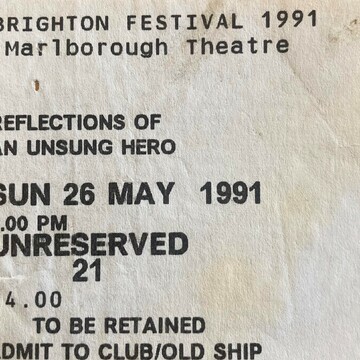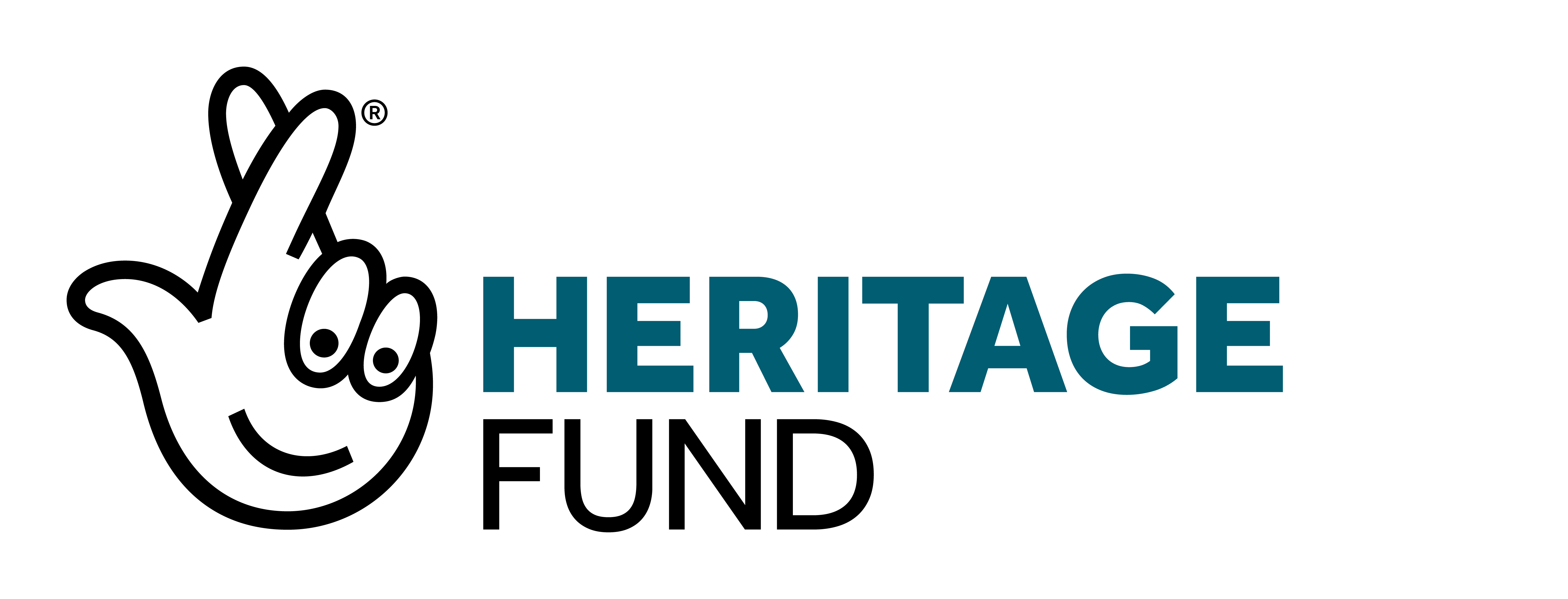Search results
-
Aputheatre Aputheatre began life as the Aids Positive Underground Theatre Company at the Sussex AIDS Centre and Helpline, and was founded by John Roman Baker and Rod Evan to provide a cultural response to the HIV and AIDS epidemic. The company was quick to establish a reputation for hard-hitting queer drama and as a result controversy often accompanied the company's performances. Surprisingly, there was even opposition at the Sussex AIDS Centre and Helpline, which at the time was attempting a mainstream reinvention to secure funding and considered the work too gay and controversial. Crying Celibate Tears was first performed at the Sussex AIDS Centre and Helpline on the 22 May 1989 as part of the Brighton Fringe Festival, and was the only Aputheatre play to be staged there. It was directed by Geoffrey Coleman, and had the following cast – Eric – Andrew St. John David – Tom Sharpstone Jeff – Nigel Greenhalgh Keith - Graham White Aside - Geoffrey Coleman was a regular customer of mine at the time and two Gardners Café chairs were borrowed to dress the set. The Ice Pick was first performed on 21 May 1990 at the Marlborough Theatre as part of the Brighton Festival. The production was awarded the Zap Award for best theatre jointly with the Satyricon Theatre of Moscow. It was directed by Robert Snell, and had the following cast – Michael – Mark Laville Peter – Nigel Fairs Michael’s father – Ted Dawson Adam – Stephen Israel Tim – Stephen Israel Eric – Stephen Israel Man at party – Ted Dawson Freedom to Party was first performed on 14 May 1991 at the Marlborough Theatre as part of the Brighton Festival. The play was directed by Paul Hodson and had the following cast. Mark – Clive Perrott Simon – Nick Miles Alex – Dino G Houtas Paul - Simon Casson The three plays gained national and international recognition when they were performed, and in 1992 they were presented together for the first time as part of Brighton Lesbian & Gay Pride and the Brighton Festival. ‘Men behave with both courage and barbarism during a war. AIDS is the war of the recent past, present and future. If AIDS is a war, then Brighton is a town on the frontline with the highest incidence of HIV and AIDS outside of London. In human terms that amounts to widespread physical and emotional devastation. Our gay community continues to be the hardest hit of all, and our fight is not only against the virus but also against the day-to-day fascism of prejudice and complacency. We must be alert to those around us who are experiencing distress because of our avoidance of AIDS. This can be in the workplace where people are discriminated against because of their HIV status, but equally in our bars, clubs and social environment. But above all we must be vigilant against the prejudice within ourselves.’ – John Roman Baker, 1992. ‘A significant breakthrough in AIDS theatre’ – Plays & Players, 1989 (Crying Celibate Tears). ‘Guaranteed to outrage the bigots! – Derek Jarman, 1991 (The Ice Pick). ‘Takes the audience into uncharted emotional territory’ – New Statesman & Society, 1991 (The Ice Pick).
-
Graham Charles Wilkinson Graham Charles Wilkinson was one of small group of gay men in London who shared a vision for innovative new centres for people living with HIV in the UK. The group started to meet and talk about their ideas at the flat of Christopher Spence OBE, who’d later become director of the Lighthouse in Ladbroke Grove when it opened in 1986. Graham was acutely aware that Brighton was desperate for services to help the growing numbers affected by the epidemic, so he set to work bringing the vision to the coast. Determined and courageous, Graham decided to quit his job to found the Sussex AIDS Helpline in a ‘grotty’ little office on Brighton’s Western Road in October 1987. In the early days, the helpline was a very hands-on affair with Graham and a few friends answering all the calls, but despite its humble beginnings, it soon became essential for anyone needing good advice, compassion and the facts. By all accounts Graham was a shy man who found the constant battles, resistance and stigma of the times hard to manage against the backdrop of his own illness. Sometimes the stress of the situation would get the better of him, but before long the light would appear in his face alongside an infectious giggle that anyone who knew him will never forget. By all accounts, Graham was a loving and supportive man who could be relied on to give someone a cuddle. Graham lived on Devonshire Place in Kemptown with his partner and playwright John Roman Baker at the time. They used their flat as a centre for the fundraising and lobbying which helped Graham to realise his vision when the Sussex AIDS Centre and Helpline opened at 3 Cavendish Street in 1988. Despite his poor health Graham played a key role in shaping, influencing and establishing the HIV services in Brighton which continue today, and his tireless commitment served to directly impact and improve the quality of lives of countless people living with HIV in Brighton. Graham ended his days at the London Lighthouse on 22 August 1990 surrounded by friends. His service was held in St Peters Church with standing room only - a testimony to the love and respect that existed for him in the city. - Danny West - 2021 22 August 2021 This evening, John and I are listening to Donna Summer and remembering Graham Wilkinson who died this day 31 years ago at London Lighthouse (at the time there was no hospice for people with HIV/Aids in Brighton). He was a tireless gay rights campaigner from the 1970s onwards and then in the 1980s fought tooth and nail as co-founder and director of the Sussex Aids Centre & Helpline (now THT South). His work, spirit and achievements should not be forgotten. It was a time when gay men in particular, but also others with HIV, were collateral damage in a deeply Conservative society where sadly even within our own community we had to fight self-hatred while the government held out for a feared heterosexual epidemic which of course (thankfully) did not materialise. Graham inspired and touched the lives of so many, but to John and myself he was so much more. He was our family and is deeply missed. Words by Rod Evan & John Roman Baker
-
Reflections of an Unsung Hero Reflections of an Unsung Hero was a solo performance created by Robert Pacitti, directed by Colin Schantz and commissioned by Aputheatre (AIDS Positive Underground Theatre Company) to cherish the work of Graham Wilkinson. Playwright John Roman Baker was so impressed by Robert’s performance of ‘Lust’ during his second year at Art School in 1990, that he approached him to create a performance to honour Graham, and gave him full copies of Graham’s diaries to work with. The commission asked for a radical live performance that responded to the content of the diaries, Graham’s Gay Liberation Front and extensive AIDS activism, and his significant lifetime legacy fighting for change. Because Graham had lost his sight, Robert wore an eye mask and travelled around Brighton on the bus to immerse himself in the role. The play was rehearsed at the Sussex AIDS Centre and Helpline in readiness for the 1991 Brighton Festival, but was nearly de-railed when Gavin Henderson, the Brighton Festival director, pulled the play from the programme due to its subject matter and the theatre company name. Lindsey Kemp was one of the festival headliners that year, and when news reached him that the play had been removed from the programme, Robert was asked to meet at his hotel. When Lindsey heard the full story, he gave Robert £500 in cash so that the play could go ahead, and had it reinstated in the festival programme. The play was performed at the Marlborough Theatre on the 26 May 1991.






